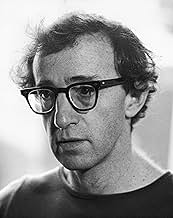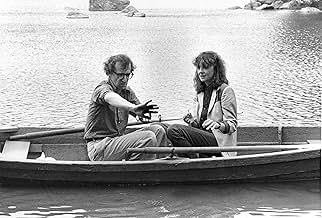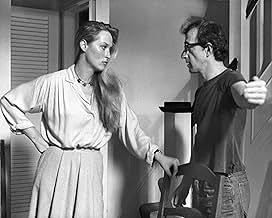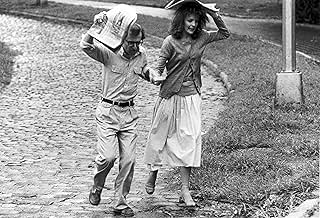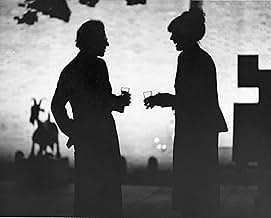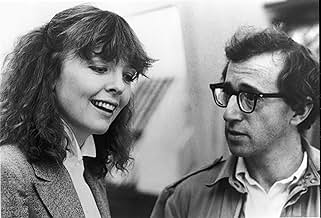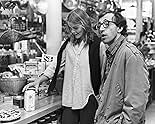A vida de um roteirista de televisão divorciado que namora uma adolescente se complica ainda mais quando ele se apaixona pela amante de seu melhor amigo.A vida de um roteirista de televisão divorciado que namora uma adolescente se complica ainda mais quando ele se apaixona pela amante de seu melhor amigo.A vida de um roteirista de televisão divorciado que namora uma adolescente se complica ainda mais quando ele se apaixona pela amante de seu melhor amigo.
- Direção
- Roteiristas
- Artistas
- Indicado a 2 Oscars
- 16 vitórias e 24 indicações no total
- Emily
- (as Anne Byrne)
- Direção
- Roteiristas
- Elenco e equipe completos
- Produção, bilheteria e muito mais no IMDbPro
Avaliações em destaque
This is one of the dark comedies and didn't work for me. Allen is going with a high-school girl, falls for a woman nearer his own age, alienates his close friend, and finally decides -- too late -- that the younger girl is his soul mate. It ends ambiguously with her leaving for Europe. The plot is out of a soap opera. It does have some witty lines (almost all of them given to Allen himself) and a lot of inside New Yorker intellectual allusions, but, aside from the Gershwin score, isn't worth seeing twice. Really, it's pretty boring. The performances aren't bad, but Allen doesn't challenge himself either. It's his old neurotic, stuttering, put-upon persona that is by now more than familiar enough. There's just nothing new.
It isn't that Allen had run out of ideas by 1979 because he's made some successful films since then -- "Hollywood Ending" and "Broadway Danny Rose", for instance. But "Manhattan" is one of the many that simply got by me. It didn't seem charming. It seemed repetitious and pointless. I didn't bother counting the times someone meets another and says, "Hiii," using the contours of the fourth tone in Mandarin Chinese. And no one seems to say it just once during a given encounter, but several times. "Hii, hii -- how AHH you?"
I kept waiting for one of two things to happen. Either IT takes off or I get drawn in. But neither contingency was realized. I cared about the entanglements in "Annie Hall," but here it didn't matter to me who wound up with whom, and I never got the feeling that it mattered much to Allen either.
Allen is so brainy and such a nebbish that he can get away with gestures that would be painfully sentimental in the hands of any other director: when he begins the movie with fireworks cut to Gershwin, it isn't to soften you up for a soap opera, but to remind you that however much his neuroses may seem to drive the scenes, its the love of New York that drives the movie.
The entire cast is note perfect: Meryl Streep as his caustic bisexual ex-wife, Diane Keaton as a nervous journalist from Philadelphia, and especially Mariel Hemingway, whose performance as Allen's 17-year old girlfriend is charming, heartbreaking, and wise.
Allen's comedy here is at its absolute finest. The fact that it is interwoven with a genuinely moving love story told with a subtlety and indirection that is unheard of in today's mainstream cinema only makes the laughs that much richer.
Gordon Willis' cinematography is good enough for the Museum of Modern Art. Scene after scene leaves a grin on your face as his moving (in both senses) black and white photography floats across the screen.
And finally underlying everything is the music of George Gershwin, whose exubertant melodies propel the movie forward at every turn.
This is Woody Allen's best movie, a great movie, and an American movie in the best sense. As an homage to the city of New York it will surely remain unsurpassed.
Grade: A
'Manhattan' is even better than the great 'Annie Hall'. The black and white cinematograpy, done with a good reason, gives a little extra to the movie. Like I said Streep is terrific and so are Allen, Keaton and especially Hemingway (she was nominated for an Oscar). The monologues Allen had in 'Annie Hall' are still present, smart, interesting and funny. A great story, very intelligent, of course written (and directed) by Woody Allen himself.
If this all seems very confusing to you, then you're not alone. Just as in 'Annie Hall,' Allen plays the hopeless romantic who is struggling desperately to understand the maddening complexity of human relationships. Though Tracy is only seventeen years old, she is arguably the most honest and mature of the women in Isaac's life; nonetheless, he doesn't treat her seriously. In his mind, anything that she says is quite obviously influenced by the naivety and downright ignorance of the young. Their relationship was never meant to be anything more than a brief "fling," and so he feels no guilt for seeing another woman behind his back, an act that makes him livid when it ultimately happens to him.
'Manhattan' was shot in beautiful crisp black-and-white by Gordon Willis, who has also worked on, among countless other films, 'Annie Hall' and the three installments of 'The Godfather.' The cinematography offers New York City a romantic 1940s feel, reminiscent of how Allen claims to remember the city as a child: "Maybe it's a reminiscence from old photographs, films, books and all that. But that's how I remember New York. I always heard Gershwin music with it, too. In 'Manhattan' I really think that we that's me and cinematographer Gordon Willis succeeded in showing the city. When you see it there on that big screen it's really decadent."
Mysteriously, this film remains the least-liked by the director himself, though, at the same time, it was also his most commercially successful. As you've no doubt already noticed from this review, 'Manhattan' is often likened to 1977's 'Annie Hall,' perhaps due to the repeated casting of Allen and Keaton (a not uncommon occurrence) or its similar attempt to uncover the elusive secrets behind love and relationships. In terms of film-making style, however, the films are quite dissimilar. Unlike the highly-energetic 'Annie Hall' which cut back and forward in time, visited old memories, broke the fourth wall and made conversations with passing extras 'Manhattan' boasts a more classical approach quiet, softly-spoken and accompanied by a wistfully slow jazzy soundtrack, also relying heavily on the works of George Gershwin.
Você sabia?
- CuriosidadesMeryl Streep shot her scenes during breaks in filming Kramer vs. Kramer (1979).
- Erros de gravaçãoIn the first scene at Elaine's, as Isaac is beginning to say something, two people (presumably customers of the restaurant, as it was running while they were shooting) walk in front of the camera. Isaac laughs, and quickly recovers with an impromptu remark about how his girlfriend has to go and do homework.
- Citações
Isaac Davis: All the times I come over here, I can't understand how you can prefer her to me.
Jill: You can't understand that?
Isaac Davis: No. It's a mystery to me.
Jill: Well, you knew my history when you married me.
Isaac Davis: I know. My analyst warned me, but you were so beautiful that I got another analyst.
- Cenas durante ou pós-créditosOne of the very few Woody Allen films to not have traditional opening credits, save the production company bumper (United Artists), and the film title MANHATTAN is seen as a long vertical flashing bright neon sign, located on the side of a New York City building, and is seen for under seven seconds just before Woody Allen narrates his first line.
- ConexõesEdited into Intimate Portrait: Diane Keaton (2001)
- Trilhas sonorasRhapsody in Blue
(1924)
Music by George Gershwin
Performed by The New York Philharmonic
Conducted by Zubin Mehta
Piano soloist: Paul Jacobs
Music director: Zubin Mehta
Principais escolhas
Detalhes
- Data de lançamento
- País de origem
- Idioma
- Também conhecido como
- Chuyện Tình Manhattan
- Locações de filme
- Empresa de produção
- Consulte mais créditos da empresa na IMDbPro
Bilheteria
- Orçamento
- US$ 9.000.000 (estimativa)
- Faturamento bruto nos EUA e Canadá
- US$ 39.946.780
- Fim de semana de estreia nos EUA e Canadá
- US$ 485.734
- 29 de abr. de 1979
- Faturamento bruto mundial
- US$ 40.194.067
- Tempo de duração1 hora 36 minutos
- Cor
- Mixagem de som
- Proporção
- 2.39 : 1


